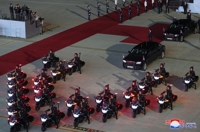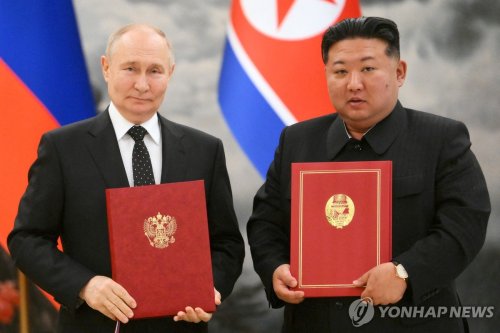(Yonhap Interview) U.S. will do 'all' it can to back S. Korea in case of China's economic coercion: official
By Song Sang-ho
WASHINGTON, May 4 (Yonhap) -- The United States will do "all" it can to support South Korea in the event of China's economic coercion against the Asian ally, a U.S. official has said, driving home an emphatic message: Washington has Seoul's back.
Melanie Hart, the head of the State Department's economic coercion response team, made the remarks during a recent phone interview with Yonhap News Agency, stressing that the U.S. is "ready" and "willing" to engage with Seoul on coercion issues if need be.
Her remarks came amid a lingering sense that the U.S. did not take sufficient action when China took thinly veiled economic retaliation against South Korea following Seoul's 2016 decision to host a U.S. THAAD anti-missile system on its soil to counter North Korean threats.
"If South Korea faced economic coercion, we would do all we can," Hart said during the interview Friday. "We are all in for South Korea and any other partners who face Chinese economic coercion. We have your back."
Seen as a key foreign policy tool, economic coercion refers to China leveraging its massive economic heft and other means to extract a policy concession from a country that has deep economic and other ties with the world's second-largest economy.
Following the decision on the THAAD installation, South Korea experienced a bitter case of apparent economic retaliation by China, which included a ban on Korean cultural content and restrictions on Chinese group tours to Korea. In the midst of the worrisome episodes, the U.S. was largely absent, stoking a sense of disappointment among South Koreans.
Now with her eight-member team in place, Hart, the senior China adviser in the office of Under Secretary for Economic Growth, Energy and the Environment Jose Fernandez, highlighted America's readiness to help South Korea and other partners in case of China's economic pressure.
"A nation or economy is welcome to reach out to us at any time. We are here when South Korea needs us, ready and willing to engage," she said.
"We are here to support our partners in doing what they can in advance to understand exactly what their risks are and look for ways to be more resilient," she added.
Her team was created when Washington needed to deal with a high-profile case involving Lithuania in the fall of 2021. That year, the Baltic state came under intense economic pressure from Beijing as the Taiwanese Representative Office, which does not use the Beijing-endorsed name, Taipei, opened in Vilnius.
The team is nicknamed the "firm" as it is modeled after a consulting firm that provides information and other forms of support to a client and remains available whenever that client is in need, while leaving the client to make his or her own decisions.
If a "client" country asks for assistance, the team is known to harness America's diplomatic expertise and resources to help it with an assessment of its economic vulnerabilities, information on how to tackle them and other forms of support.
"What we aim to do is lay out options, share information, offer assistance, and engage other allies and partners, but every step of the process is that country's choice," Hart said. "In no way is the United States seeking to insert itself into a country's decision-making."
Asked about how her team would help South Korea should it fall under China's economic pressure, she said the kind of U.S. support depends on specific situations that might flare up.
"We don't promise in advance any particular type of help or economic assistance, because the ways in which we and our allies and partners would help vary depending on the scenario," she said.
The creation of her team was made public recently as Seoul and Washington have been deepening economic security cooperation in the midst of the U.S.' push to diversify and reshape global supply chains for semiconductors and other industrial sectors to reduce heavy reliance on China.
Such economic collaboration between the allies has raised fresh concerns over the possibility of South Korea drawing the ire of China.
To address such concerns, a State Department official, who requested anonymity, took note of an agreement on trilateral cooperation to overcome economic coercion that South Korean President Yoon Suk Yeol, U.S. President Joe Biden and Japanese Prime Minister Fumio Kishida reached during their Camp David summit in August.
"We are already partnering together to bolster supply chain resilience and capacity to respond to economic coercion and global supply chain disruptions," the official said. "As we all get better at making all of our supply chains resilient, this will become less of an issue."
Despite the team's readiness to back allies and partners, questions linger over to what extent the U.S. can help them at a time when Washington is striving to "de-risk" the tense Sino-U.S. relationship marked by an intense strategic rivalry.
"We don't censor ourselves or hold back from doing smart, important things with allies and partners based on whether or not China might complain about it," the unnamed official said.
"We view this work as really critical because the international system that we all depend on doesn't work if nations don't have the space to make their own choices in their own national interests. We need independent nations to be free to make their own choices from coercion."
Thus, Washington views its anti-coercion efforts to support partners as a "core" U.S. national interest, the official stressed.
sshluck@yna.co.kr
(END)
-
 (Movie Review) 'Hijack 1971' hijacks real drama, lacks visceral intensity
(Movie Review) 'Hijack 1971' hijacks real drama, lacks visceral intensity -
 BTS' Jimin to drop new album next month
BTS' Jimin to drop new album next month -
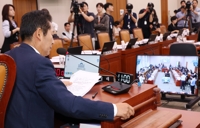 DP's push for special probe bill on Marine's death gains traction despite PPP boycott
DP's push for special probe bill on Marine's death gains traction despite PPP boycott -
 (LEAD) N. Korean soldiers briefly cross border for 2nd time in less than 2 weeks
(LEAD) N. Korean soldiers briefly cross border for 2nd time in less than 2 weeks -
 Romania to buy S. Korean K-9 howitzers for US$920 mln
Romania to buy S. Korean K-9 howitzers for US$920 mln
-
 (Movie Review) 'Hijack 1971' hijacks real drama, lacks visceral intensity
(Movie Review) 'Hijack 1971' hijacks real drama, lacks visceral intensity -
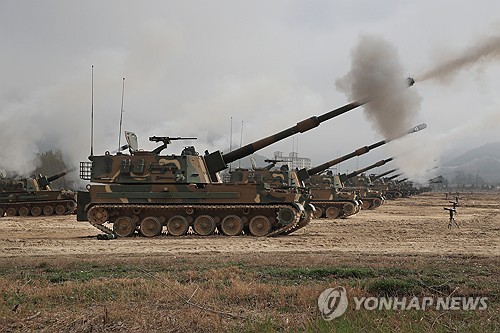 Romania to buy S. Korean K-9 howitzers for US$920 mln
Romania to buy S. Korean K-9 howitzers for US$920 mln -
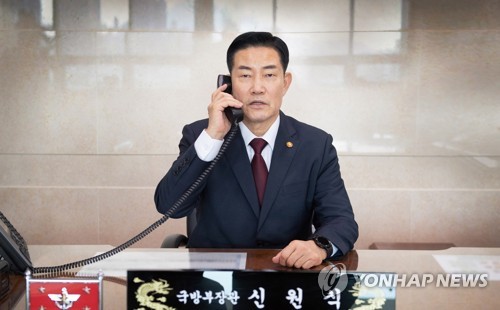 Defense minister to visit Romania, Poland for arms cooperation
Defense minister to visit Romania, Poland for arms cooperation -
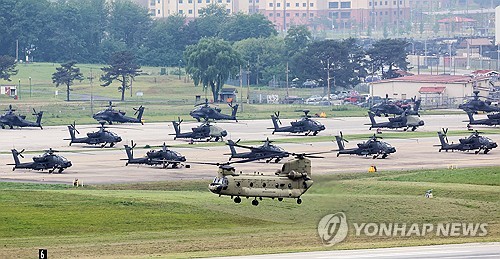 (LEAD) U.S. House passes annual defense policy bill including USFK troop maintenance
(LEAD) U.S. House passes annual defense policy bill including USFK troop maintenance -
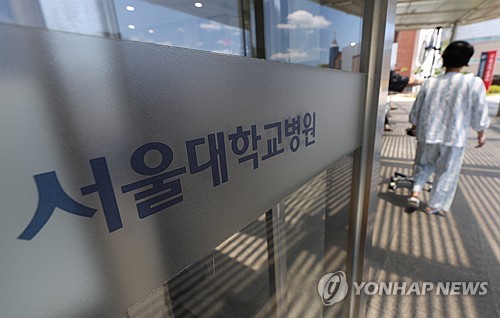 (LEAD) SNU medical professors begin indefinite walkout
(LEAD) SNU medical professors begin indefinite walkout
-
 Romania to buy S. Korean K-9 howitzers for US$920 mln
Romania to buy S. Korean K-9 howitzers for US$920 mln -
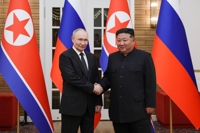 (4th LD) Kim declares N. Korea's relations with Russia upgraded to alliance
(4th LD) Kim declares N. Korea's relations with Russia upgraded to alliance -
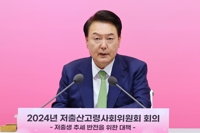 (LEAD) Yoon declares 'demographic national emergency,' vows all-out efforts to tackle low birth rate
(LEAD) Yoon declares 'demographic national emergency,' vows all-out efforts to tackle low birth rate -
 (6th LD) Russia, N. Korea ink partnership treaty calling for mutual assistance if either is attacked
(6th LD) Russia, N. Korea ink partnership treaty calling for mutual assistance if either is attacked -
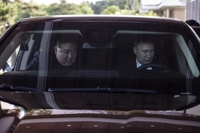 Putin gives another luxury Russian limousine to Kim as gift
Putin gives another luxury Russian limousine to Kim as gift





